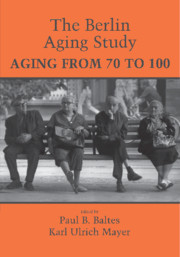Book contents
- Frontmatter
- Contents
- Acknowledgments
- Introduction
- Part A Theoretical Orientations and Methods
- Part B Major Results from the Four Research Units
- 5 Morbidity, Medication, and Functional Limitations in Very Old Age
- 6 Psychiatric Illnesses in Old Age
- 7 Trends and Profiles of Psychological Functioning in Very Old Age
- 8 Socioeconomic Conditions and Social Inequalities in Old Age
- Part C Interdisciplinary Findings
- Part D Overview and Outlook
- Notes on Contributors
- Abbreviations
- Author Index
- Subject Index
8 - Socioeconomic Conditions and Social Inequalities in Old Age
Published online by Cambridge University Press: 06 December 2010
- Frontmatter
- Contents
- Acknowledgments
- Introduction
- Part A Theoretical Orientations and Methods
- Part B Major Results from the Four Research Units
- 5 Morbidity, Medication, and Functional Limitations in Very Old Age
- 6 Psychiatric Illnesses in Old Age
- 7 Trends and Profiles of Psychological Functioning in Very Old Age
- 8 Socioeconomic Conditions and Social Inequalities in Old Age
- Part C Interdisciplinary Findings
- Part D Overview and Outlook
- Notes on Contributors
- Abbreviations
- Author Index
- Subject Index
Summary
In this chapter we examine the social and economic life circumstances of old and very old people in West Berlin, and the ways different socioeconomic resources influence social participation and aspects of physical and mental health. Information on education, occupational position, household income, housing conditions, forms of household, social activities, and media consumption is analyzed. Three hypotheses about socioeconomic differentiation and its consequences are examined: (a) the hypothesis of age-relatedness, where socioeconomic factors lose importance in comparison to age-related conditions such as health; (b) the hypothesis of socioeconomic continuity, which suggests that socioeconomic differences continue to influence life-styles and activities in old age; and (c) the cumulation hypothesis, where the impact of socioeconomic differentiation increases in old age.
In this study, we mainly find age-associated differences in social activities and social participation, both of which are highly related to health status. In these cases, socioeconomic resources can only partially compensate for health impairments. Until the move into a senior citizens' home, stability in income and housing conditions is found, reflecting the social position attained before retirement. Thus, in terms of the economic situation, age does not discriminate between individuals. Only with regard to utilization of care can we confirm the cumulation hypothesis, where socioeconomic inequality in old age becomes more pronounced: Members (mostly male) of higher social classes are rarely institutionalized and are more likely to be cared for at home. […]
- Type
- Chapter
- Information
- The Berlin Aging StudyAging from 70 to 100, pp. 227 - 256Publisher: Cambridge University PressPrint publication year: 1998
- 2
- Cited by



